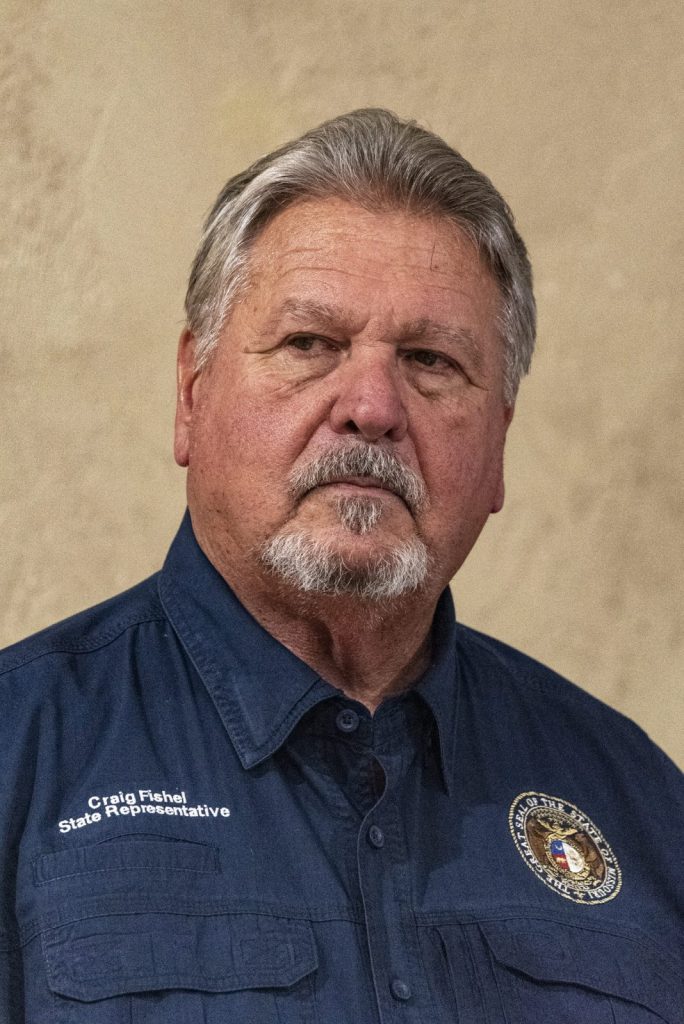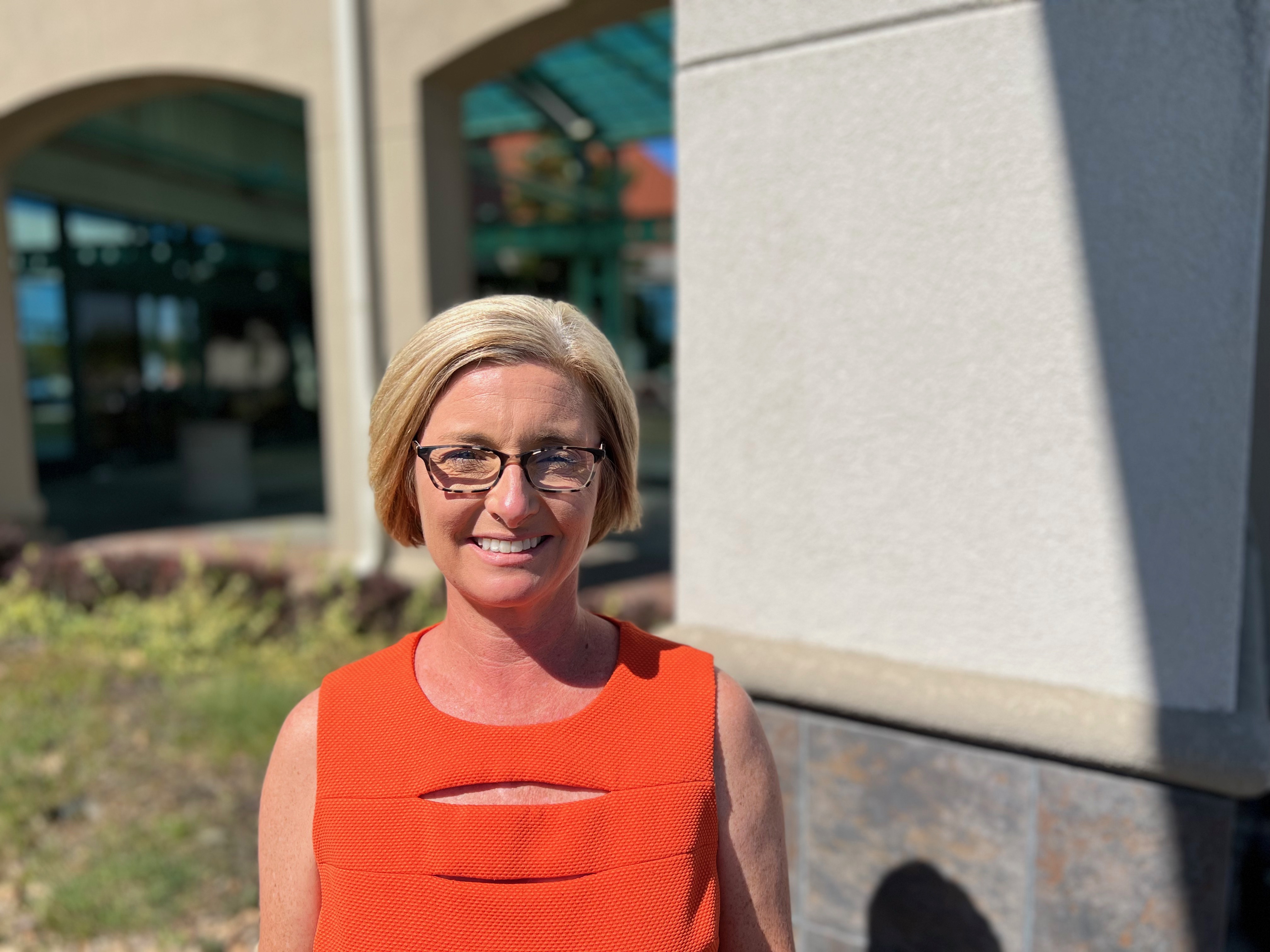Republican Rep. Craig Fishel is seeking his third term in the Missouri legislature’s lower chamber, but Democrat Stephanie Hein bears the burden of trying to flip a Republican stronghold.
House District 136 has been represented by Fishel since 2018, when he first won the southeast Springfield district by double digit percentage points. In the 2020 election, he strengthened that lead.
However, since redistricting took place earlier this year, the district looks drastically different, and that could impact the results of the election.
What once encompassed southeastern parts of the city extending to the Greene-Christian County border and east of Highway 65,the 136th lost some of its more rural constituency, and went deeper into the city. Most of the district now primarily sits north of James River Expressway and west of Highway 65, with few exceptions, and now expands past Campbell Avenue and Sunshine Street.
Estimates show the district did, in fact, grow bluer, but this year’s general election will be the first test.
A SW Missouri native and business owner, Fishel went from council to state rep
Fishel, a Missouri native from Lebanon, graduated from Glendale High School, and obtained a bachelor’s degree in industrial technology from Missouri State University.

(Photo by Jym Wilson)
He currently resides in Springfield with his wife, where he has owned and operated Fishel Pools for more than 40 years. They have two children and two grandchildren.
Prior to running for the Missouri House, Fishel served on the Springfield City Council for five years, first elected in 2013.
As a representative, he serves on the Budget Committee, the Local Government Committee, the Subcommittee on Appropriations and as the Vice-Chairman of the Consent and House Procedure Committee.
Fishel also has been a board member of the National Spa and Pool Institute, volunteered for the Girls and Boys Scouts, and serves in various capacities for several Springfield churches as a deacon and a trustee.
From hospitality to education to politics, Hein’s career path has taken many turns
Hein also grew up in southwest Missouri, where she graduated from Hartville High School and later attended MSU, where she obtained a bachelor's degree in hospitality and restaurant administration. She now has a doctorate in educational leadership and policy analysis from the University of Missouri.
She has spent much of her professional career in the service industry, including time in Denver, Nashville and St. Louis. However, when Hein’s daughters were old enough to start school, she and her husband decided to move back to Springfield in 2001.

Hein has since transitioned her career into education, where she has worked as the head of MSU’s Department of Hospitality Leadership.
She was named one of Springfield’s Most Influential Women in 2014 and has served on the Springfield Airport Task Force and the Springfield Convention and Visitors Bureau.
Hein emphasizing importance of public education
Hein comes from a family of public educators, and works in education, albeit higher education, herself. Between having lived in urban and rural areas, she understands that school districts have all of their own little nuances.
Hein feels comfortable with, for the most part, giving individual school districts and school boards the power to make decisions that are best for the students, as long as they are following frameworks provided by the Missouri Department of Elementary and Secondary Education.
“When you get to the issue of curriculum development, I do want to acknowledge something that isn’t perhaps discussed enough,” Hein said. “Teachers spend four years in higher education and being trained on how to develop curriculum and pedagogy. … I do think it’s important that we recognize that teachers have gone through that specific training.”
On her campaign website, Hein stressed the need to increase teacher pay and funding for public education. “This is unacceptable and is a failure to invest in our children's future,” Hein says on her campaign website. “Funding our public education system and setting our children up for success is a top priority for me.”

She also expressed her support for universal early childhood development, and tied in how it could potentially alleviate some of the burdens caused by the ongoing child care shortage.
Fishel acknowledged the role of local school boards to meet standards established by the state, which provides substantial funding to public schools.
“The state provides the funding for districts to ensure that students meet the standards for graduation set by the state,” Fishel said. “Our goal is to graduate students with skills to prepare them to meet the rigors of day-to-day living. Local school boards ensure that their schools are in compliance with these requirements.”
However, Fishel said the ultimate responsibility of providing opportunity for children to acquire these skills is with the parents.
“Parents should be the No. 1 decision-maker in their child’s education,” a mailing flyer in support of Fishel from the Missouri Federation for Children PAC says.
On teacher salaries, Fishel voted for House Bill 3002 in the 2022 session, which, in part, raised Missouri’s baseline teacher salary from $25,000 to $38,000 and provided temporary state funding.
In 2021, Fishel filed a Sunshine Law request to obtain records from Springfield Public Schools. He wanted to search for various documents that contained any of 22 key phrases, including “Black Lives Matter,” “social justice,” and “diversity equity and inclusion.” SPS placed a $179,000 price tag on the request.
Addressing child care shortage
Hein has personally experienced the woes of the child care crisis, as she had to spend some time out of the workforce before her children were old enough for school, because paying for child care didn’t financially make sense.
“It’s getting the attention it deserves,” Hein said. “But it’s been a problem for a while. … It is long overdue.”
While she noted that there were several paths the legislature could take to address this issue, Hein primarily focused on expanding Pre-K opportunities within the current public school system, which could, in turn, boost families’ incomes due to their ability to not have to budget for full-time child care for 3- and 4-year-olds.

“You start to alleviate some of the pressures that businesses feel because of [freeing up] the hidden workforce,” she said. “Then ultimately, if you start getting people within that structure of public education, you have the opportunity to have better paying jobs with benefits for those individuals who are providing public or early childhood education.”
Fishel did not respond to the Daily Citizen’s question about the state’s role in addressing the child care shortage.
The same bill that Fishel voted for regarding teacher pay (HB 3002) also allocated more than $22 million from the General Revenue Fund for child care subsidies for children of families experiencing varying degrees of poverty and children under the care of the Department of Social Services.

Fishel emphasizes support for law enforcement to deal with opioid epidemic
When it comes to addressing the opioid crisis in Missouri, Fishel emphasized the importance of supporting law enforcement agencies and ensuring the criminal justice system is following the rule of law.
“As a nation, we need to close the border,” Fishel said. “At the state level, we must take care of our law enforcement officers, who deal with this at ground level, by providing resources that help them protect and serve the communities. I support getting rid of prosecutors and judges who do not prosecute these crimes according to law.”
Fishel expressed similar views on how to address crime and enhance public safety in Missouri.
Hein said the issue impacts people at every economic level and has been compounded due to the pandemic. She highlighted the need to properly fund services for individuals suffering from addiction.
“On the state level, we have to have the resources put in place to make sure all those systems are firing, so that if somebody is in a crisis situation, they can receive help,” Hein said. “When you don’t provide those resources, you’re just exacerbating the problem.”
Gun rights and ‘red flag' laws
Fishel affirmed his commitment to the 2nd Amendment rights to bear arms and didn’t support “red flag” laws, which would allow a judge to temporarily take away someone’s gun based on the suspicion they will use it to hurt themselves or others, as they are currently written by other states.
“Due to the ambiguity of how most of these laws are written, I do not support the arbitrary violation of a citizen’s right to bear arms, as guaranteed in our U.S. Constitution,” Fishel said.
Hein, who lived in Denver when the Columbine massacre occurred, is open to exploring solutions that could reduce gun violence in Missouri. “Things that we can be sensible about to protect future mass shootings from happening within our state,” Hein said.
Abortion stances widely different
Hein said the “personal, private and painful” health care decision to receive an abortion should be between a patient and their doctor.
“I feel like we’ve gone way too far with the trigger ban that was enacted,” Hein said. “No exceptions for rape or incest? It’s perplexing, it’s baffling. I would work to reverse that and I would work to protect birth control.”

Fishel, conversely, voted for HB 126, also known as the Missouri Stands for the Unborn Act in 2019. This law went into effect as a part of the trigger ban enacted by the Missouri Attorney General and U.S. Senate candidate Eric Schmitt in the immediate aftermath of the Supreme Court reversal of Roe v. Wade.
However, Fishel said the law needs to be clarified, and that we need to explore strengthening our adoption system. “The current law needs better clarity,” Fishel said. “Going forward, we need to take a serious look at our adoption laws and provide a better way for unwanted babies to be placed in a loving home.”
Hein leads opponent in campaign contributions
Based on all of the most recent campaign finance reports, Hein’s campaign is the only challenger to an incumbent in the Springfield area that has raised more money than her opponent.
Hein is reporting north of $44,000 on hand with less than three weeks of campaigning to go, compared to Fishel’s $26,585.
These reports, filed on Oct. 17, may not reflect spending by independent outside organizations on behalf of either campaign.
(Editor’s note: Daily Citizen Board Chairman Thomas Carlson and his wife Chandler, as well as board members Jim Anderson and M. Suzanne Shaw, have made donations to Hein’s campaign. The Carlsons also hosted a fundraiser for Hein. Board members play no role in news coverage decisions.)
Despite the financial support and potentially boosted chances due to redistricting, Hein said she remains focused on what she can do to win. “Am I hopeful?” Hein asked herself. “Yes, optimistic, maybe cautiously so.”
Where and when to vote, and what you need to bring (Click to expand story)
When and where: The general election will take place on Nov. 8. Polls open at 6 a.m. and close at 7 p.m. You can identify your polling location here. Information on absentee voting in Greene County can be found here.
Finding your district: Information about what state House and Senate district you might live in can be found here.
What you need: This is the first election that Missouri’s new photo ID law will be in effect. The Secretary of State’s website provides information about what forms of ID will be acceptable.

